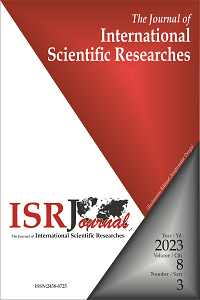Abstract
With today's digital transformation, consumer habits have changed, and online shopping has become widespread. E-retail sites influence consumers' impulse buying behavior, defined as buying behavior with a sense of instant excitement and predominantly strong impulses. In online consumer behavior, the flow experience has attracted attention as a factor in recent years. The purpose of this study, which focuses on online consumer behavior, is to determine the impact of flow theory on online impulse buying. At the same time, examining the moderating role of customer satisfaction on flow and online impulse buying behavior is also included in the scope of the study. For this purpose, an online survey was conducted with 283 volunteer participants over 18 who have shopped at least once on an e-retail site. The data obtained from the study were analyzed with SmartPLS 4 program. When the results obtained from the study are analyzed, it is determined that flow status significantly affects online impulse buying. On the other hand, it was determined that customer satisfaction did not have a regulatory role on flow and online impulse buying.
Keywords
References
- Alam, S. S., & Yasin, N. M. (2010). An investigation into the antecedents of customer satisfaction of online shopping. Journal of Marketing Development and Competitiveness, 5(1), 71–78.
- Alalwan, A. A., Rana, N. P., Dwivedi, Y. K., & Algharabat, R. (2017). Social media in marketing: A review and analysis of the existing literature. Telematics and Informatics, 34(7), 1177–1190.
- Anderson, R. E., & Srinivasan, S. S. (2003). E‐satisfaction and e‐loyalty: A contingency framework. Psychology & marketing, 20(2), 123-138.
- Baker, D. A., & Crompton, J. L. (2000). Quality, satisfaction and behavioral intentions. Annals of Tourism Research, 27(3), 785-804.
- Bridges, E., & Florsheim, R. (2008). Hedonic and utilitarian shopping goals: The online experience. Journal of Business research, 61(4), 309-314.
- Bilgihan, A., Okumus, F., Nusair, K., & Bujisic, M. (2014). Online experiences: Flow theory, measuring online customer experience in e-commerce and managerial implications for the lodging industry. Information Technology & Tourism, 14(1), 49–71.
- Bhatnagar, A., Misra, S., & Rao, H. R. (2000). On risk, convenience, and internet shopping behavior. Communications of the ACM, 43(11), 98–105.
- Can Arslan, N. (2017). Onlıne kitlesel bireyselleştirmede ürün değeri ve akış deneyiminin ödeme isteği ile satın alma olasılığına etkisi. Doktora tezi, Anadolu Üniversitesi Sosyal Bilimler Enstitüsü, Eskişehir.
- Chen, H., Wigand, R. T., ve Nilan, M. (2000). Exploring web users' optimal flow experiences. Information Technology & People, 13(4), 263-281.
Abstract
References
- Alam, S. S., & Yasin, N. M. (2010). An investigation into the antecedents of customer satisfaction of online shopping. Journal of Marketing Development and Competitiveness, 5(1), 71–78.
- Alalwan, A. A., Rana, N. P., Dwivedi, Y. K., & Algharabat, R. (2017). Social media in marketing: A review and analysis of the existing literature. Telematics and Informatics, 34(7), 1177–1190.
- Anderson, R. E., & Srinivasan, S. S. (2003). E‐satisfaction and e‐loyalty: A contingency framework. Psychology & marketing, 20(2), 123-138.
- Baker, D. A., & Crompton, J. L. (2000). Quality, satisfaction and behavioral intentions. Annals of Tourism Research, 27(3), 785-804.
- Bridges, E., & Florsheim, R. (2008). Hedonic and utilitarian shopping goals: The online experience. Journal of Business research, 61(4), 309-314.
- Bilgihan, A., Okumus, F., Nusair, K., & Bujisic, M. (2014). Online experiences: Flow theory, measuring online customer experience in e-commerce and managerial implications for the lodging industry. Information Technology & Tourism, 14(1), 49–71.
- Bhatnagar, A., Misra, S., & Rao, H. R. (2000). On risk, convenience, and internet shopping behavior. Communications of the ACM, 43(11), 98–105.
- Can Arslan, N. (2017). Onlıne kitlesel bireyselleştirmede ürün değeri ve akış deneyiminin ödeme isteği ile satın alma olasılığına etkisi. Doktora tezi, Anadolu Üniversitesi Sosyal Bilimler Enstitüsü, Eskişehir.
- Chen, H., Wigand, R. T., ve Nilan, M. (2000). Exploring web users' optimal flow experiences. Information Technology & People, 13(4), 263-281.
Details
| Primary Language | English |
|---|---|
| Subjects | Digital Marketing, Consumer Behaviour |
| Journal Section | Articles |
| Authors | |
| Publication Date | October 27, 2023 |
| Submission Date | August 25, 2023 |
| Published in Issue | Year 2023 Volume: 8 Issue: 3 |



